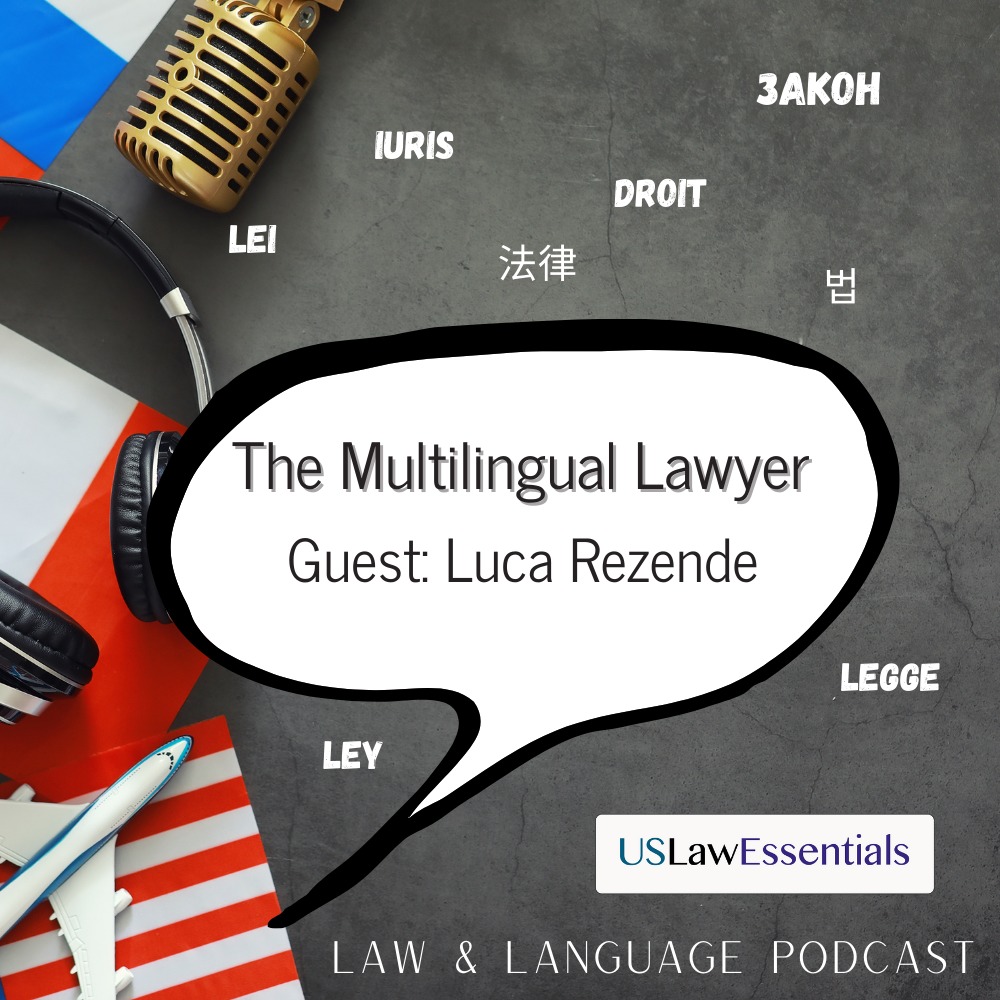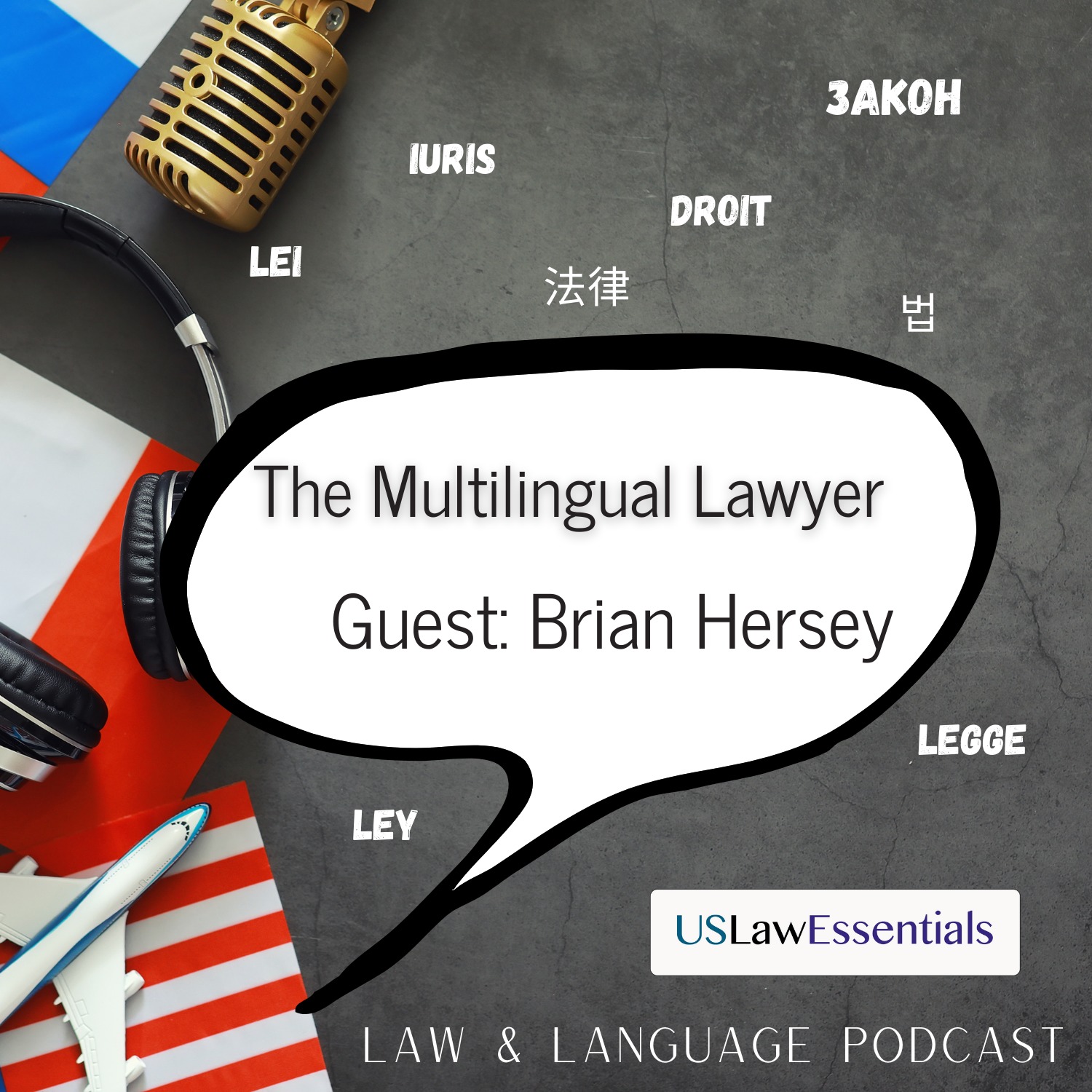Speaker 0 00:00:00 I think that process is really important for developing one's English and also for developing one's legal, analytical skills.
Speaker 1 00:00:09 Yeah, I think you're right. So on the S a T you only have to pick the right answer, but in this discussion, we're really focused on the conversation and the language we use to think through. And that's the kind of language you're going to need to, uh, engage in communication in us legal culture,
Speaker 2 00:00:34 Supreme,
Speaker 0 00:00:35 Welcome to the us law essentials law and language podcast, the legal English podcast for non-native English speakers that helps you improve your English, listening, improve your legal English vocabulary and build your knowledge of American legal culture. Hi, this is Daniel. And before we begin today's episode, I wanna remind you that us law essentials offers online courses in legal English, and online courses in us law. Our courses are designed for international attorneys, students, translators, and bar candidates. If you have any questions, please contact Daniel
[email protected]. Also, please visit
[email protected] and join us on Facebook and LinkedIn. And now today's episode.
Speaker 1 00:01:28 Hi, and welcome to the us law essentials law and language podcast. I'm Steven Horowitz
Speaker 0 00:01:34 And I'm Daniel Edelson
Speaker 1 00:01:36 Today. We're continuing our focus on vocabulary, but we're going to do it through analogies. In other words, comparisons, the goal is to help listeners get familiar with the language of analogy and comparison because in the us common law system, judges and lawyers must frequently use analogy and comparison to effectively explain similarities and differences in cases.
Speaker 0 00:02:00 Ooh, that sounds exciting. Let's get started, Steve.
Speaker 1 00:02:04 Okay. Today we have an analogy problem from an S a T test, uh, S a T is the standardized test that us students historically have had to take as part of the college admissions process. And this problem reads car is to road is train is to blank. You got that.
Speaker 0 00:02:26 Okay. So car relates to a road in the same way the train relates to, and now we have four choices.
Speaker 1 00:02:33 Yeah. We've got track vehicle fast and wheel.
Speaker 0 00:02:39 Okay. So a car relates to a road in the same way that a train relates to, and I have to choose track vehicle faster wheel.
Speaker 1 00:02:48 Yeah. What do you think? What do you think the right answer is?
Speaker 0 00:02:51 Well, cars to road. I know a car travels down a road, right? Uhhuh <affirmative>. And so in the same way that a car travels down a road, I would say a train travels down a track.
Speaker 1 00:03:05 Okay. And, okay. So like, so you could say a car travels down a road, you could say a car drives on top of a road or drives on a road in the same way that a train drives on a track. So that seems to work well, what about vehicle? Yeah,
Speaker 0 00:03:21 That that's tricky, right? Because cars and trains are types of vehicles, but that's, that's not what we're comparing here. We're comparing car to road and train to something else. So the first part of the analogy is telling us I is relating the car to the road, what the car moves on, and it moves on a road, a train doesn't move on a vehicle.
Speaker 1 00:03:48 So, so vehicle could make sense. It maybe if you had a different kind of question that was car is to road, as blank is to pass or channel, uh, or, or something like that, because then it would be a car. A vehicle is a more general category for car, uh, and a path or a channel is a more general term or category for road. But, but in this situation, vehicle doesn't make sense. Okay. What about fast,
Speaker 0 00:04:23 Fast cars to road as train is to fast, you know? Yeah. That doesn't work. You'd have to say something like a car can go fast on a road and a train can also go fast, but that doesn't really make sense because when you compare car road, what all, all we know is the car travels on the road. You know, it can go fast or slow or whatever, and a train likewise goes on a track, but it, we're not talking about speed here, so I don't see why fast work. Right.
Speaker 1 00:04:58 Okay. Okay. And the last one wheel,
Speaker 0 00:05:03 Uh, geez. Train is to wheel, um, oh, oh, I guess do trains have wheels? Trains have wheels, right.
Speaker 1 00:05:13 So yes. Last I check trains have wheels. I mean, unless it's one of those monorail monorails that like glides on the, on the mag, on the magnetic track and there's no wheel <laugh>.
Speaker 0 00:05:24 Right. But that doesn't seem to be the call of the question. So no, a car. Yeah. Again, a car, a car travels on a road. And I guess a wheel sort of helps a car travel on a road and a wheel might help a train travel on a track. But again, it's car travels on a road, train travels on a track and wheel is just not relevant to this comparison.
Speaker 1 00:05:52 Yeah. A wheel is a part of a car, but a road is not a part of a car and a wheel is a part of a train, but a road is not a part of a train. So wheel doesn't make sense there either.
Speaker 0 00:06:04 Yeah. I mean, I guess you could, I guess if it was something like cars to wheel as train is to Malave <laugh> maybe that would, maybe that
Speaker 1 00:06:15 Would work. There you go. Okay. You ready for one more?
Speaker 0 00:06:21 I'm not sure. But go ahead.
Speaker 1 00:06:24 Okay. This one's a little more abstract. Okay. Arrival arrival is to departure as blank is to death.
Speaker 0 00:06:37 Ooh. Oh, okay. Okay. Arrival is to departure as something is to death. Okay. What are my choices and,
Speaker 1 00:06:48 Uh, life person birth or train
Speaker 0 00:06:54 Train again? Huh? Um,
Speaker 1 00:06:56 Yeah. Again with the trains.
Speaker 0 00:06:58 Okay. Okay. Well, all right. How about this? I could say, uh, like an arrival is like the opposite of a departure and life is the opposite of death. So maybe I should go with the first choice. Arrival is depart is
Speaker 1 00:07:17 Yeah.
Speaker 0 00:07:17 Does life is to death. There we go.
Speaker 1 00:07:20 That's that's not a bad choice. Right. And then person arrival is the opposite of departure as person is the opposite of death. That wouldn't work so well. Yeah. As person is not the opposite of death and train. I mean, you think about arrivals and departure as your brain jumps to trains, but, but train is not the opposite of death. Um, right. So the, the one other choice left is birth.
Speaker 0 00:07:45 Oh no. Oh,
Speaker 1 00:07:48 Birth is also the opposite of death, right? Is it,
Speaker 0 00:07:54 Um, birth
Speaker 1 00:07:54 Is kind of the opposite of death. You, you could, you could say,
Speaker 0 00:07:58 Yeah, it it's, it, it, it's almost like you're arriving into this world,
Speaker 1 00:08:03 Right? Oh, a birth is like an arrival and death you could say is like a departure.
Speaker 0 00:08:10 Oh, oh.
Speaker 1 00:08:12 So life, life is the opposite of death. And birth is the opposite of death. So they both fit the opposite relationship. So now we have to distinguish, I think between life and birth, not in terms of just opposites, but something more specific.
Speaker 0 00:08:32 I see. I see. Well, but if they're both opposites, then how do I know which to choose?
Speaker 1 00:08:44 I, I think of it like a, a jacket you're looking for a jacket that fits right. And the life jacket. So to speak the life jacket fits pretty well. But I think the birth jacket fits even better. It's like custom tailored <laugh> because birth is literally an arrival and death is a departure and life is not an arrival. Life is the whole period, not just the beginning, whereas arrival suggests the beginning. So I think the, the birth analogy or the birth jacket fits a little bit better than the life one.
Speaker 0 00:09:23 That's a, that's a really good point. Well, all right. So Steve, I, I got a question here. Yeah. This is supposed to be a podcast to help people learn English. Right? Yeah. And I feel as though people could answer these questions by simply translating these words into their first language and then deciding on and answer, you know, translating it. So how is this, how is this really gonna help people learn, learn English?
Speaker 1 00:10:00 Um, I think this is particularly helpful for, for learning academic English and, and legal English, because it requires you to think about categorization words and categorization words are crucial for effective legal English, uh, communication, because, um, lawyers are frequently asked to, or called on or required to think about the general category for some specific terms. For example, if you, if you have emails, texts, and faxes, uh, a more general term might be electronic messages, or it might be electronic communications. Um, but the word you choose could have a big effect and how you categorize something can have a big effect on what is legal or what is illegal or on what is a violation and what is not a violation. Um, and so being a, yeah, being able to jump back and forth, um, between the specific and the general in, in a way where you have a lot of control and you really understand the differences and the distinctions, um, is a big part of what it means to be a lawyer in a us common law system.
Speaker 0 00:11:18 That's, that's a really good point, Steve, and, and, and I'm actually thinking of something else too. I think also in terms of practicing one's English and practicing legal English frequently in the us, the result that you come to in terms of your analysis, isn't as important as explaining how you arrived at your result. So just like the way you taught me that birth is the better choice and you had to use different vocabulary and you had to justify your reasoning. I think that process is really important for developing one's English and also for developing one's legal, analytical skills.
Speaker 1 00:12:06 Yeah. I think you're right. So on the S a T you only have to pick the right answer, but in this discussion, we're really focused on the conversation and the language we use to think through. And that's the kind of language you're going to need to, uh, engage in communication in us legal culture.
Speaker 0 00:12:27 That's that's great. And can I use the word train again? Would that be sure? So I, some great, some great training and practice that people could try is taking these same examples that we used and using your own vocabulary. Try to explain why one choice is better than another choice and explaining how you would compare these different vocabulary, words, and ideas.
Speaker 1 00:12:54 I think that's great advice, Dan. Okay. Thanks, Dan. Thanks so much. Uh, that seems like really essential information.
Speaker 0 00:13:01 Thank you, Steve. Okay. I got one more for you. Ready?
Speaker 1 00:13:04 Yeah.
Speaker 0 00:13:04 Yeah. Okay. Steven is too essential as Daniel is too,
Speaker 1 00:13:12 Uh, essential, I guess. Right.
Speaker 0 00:13:15 Perfect. All right. Stay essential.
Speaker 1 00:13:18 Stay essential, Dan.


